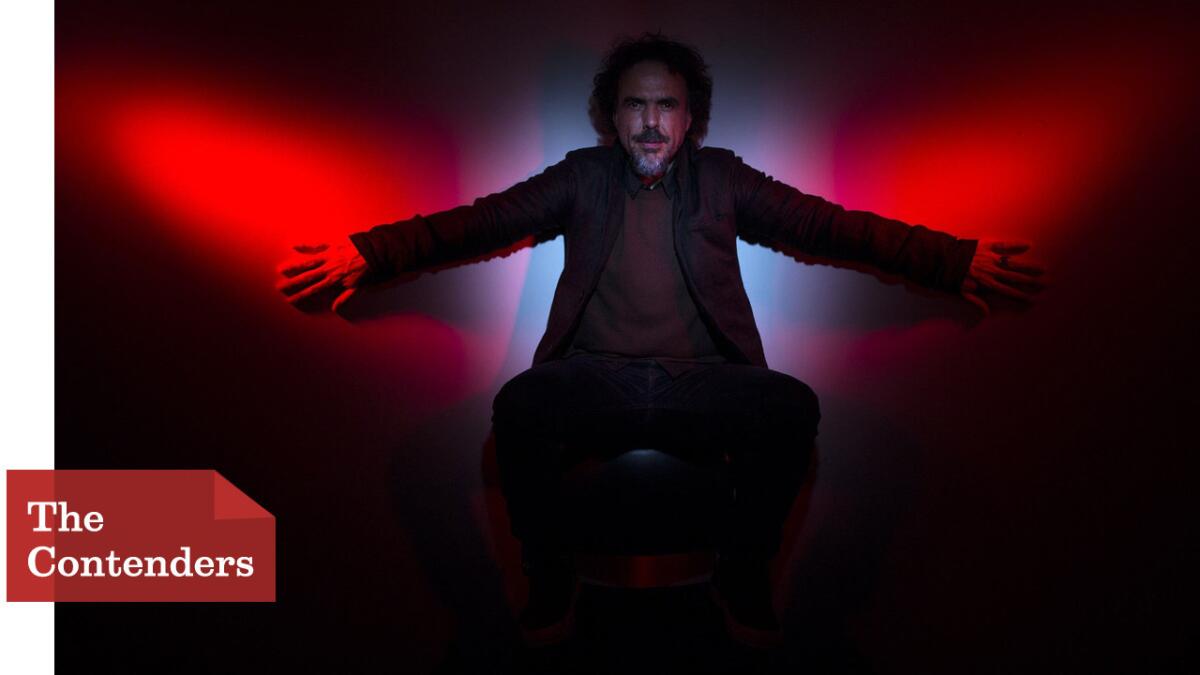The Envelope: Oscars 2015: Director Alejandro G. Inarritu sees the ‘Birdman’ in us all

- Share via
Some writers say they don’t set out to make a statement but to ask a question. For Alejandro G. Iñárritu, director and co-writer of “Birdman,” there were plenty of questions — about ego and id, self-worth, purpose and identity — just not the kind usually found in a fast-paced backstage comedy.
“What is the meaning of all this? Why am I doing what I’m doing? I’m always looking for something that will in some way electrify me with joy,” he says. “It’s a relentless question. That’s what drives me and where I relate to this guy.”
In “Birdman,” “this guy” is protagonist Riggan Thomson, played by Michael Keaton. Riggan is a washed-up action star on a Quixotic quest to adapt, direct and star in a Broadway play to reestablish himself as an artist. Iñárritu says Riggan’s existential frustrations came very much from his own, something reflected in how the other characters can seem like parts of the protagonist’s own psyche, alternately helping and hindering.
FULL COVERAGE: Oscars 2015
“All those characters are very, very close to me internally or physically. I relate to all of them. I have a daughter and a son, and I have, in the last 15 years, related to people who look like those guys, and I have become those guys,” says the filmmaker.
“Michael is lying when he says he is not Riggan because nobody could not relate to that guy. Everybody’s insecure and everybody questions our own success. Everybody questions our priorities. Nobody escapes. And on the set, all of us felt a joyful embarrassment of portraying things we have been involved in. There’s a delicious joy to being empathic to these lovably pathetic creatures we are.”
In keeping with the introspection invited by these questions, the twice-Oscar-nominated maker of multilayered dramas such as “Babel” and “Amores Perros” decided to present the entire comedy as a single, unbroken take (hidden edits notwithstanding).
“That emotional state that is so complex in his mind, this mechanism of getting everything to flow without cuts, that’s what I was trying to do. Not to impress anybody technically. If people are distracted by that, we’ve failed. I’m not a technician; I’m an artist,” he says, shaking his wild, mad-scientist hair.
“The difficult thing here is that I didn’t have any precedent, ‘Here are the rules of the game.’ There are no rules. I didn’t find any comedies that had been done in one shot. Even [director] Mike Nichols — rest in peace — told me one week before I started shooting, ‘Alejandro, this is madness. You should stop. You are running toward disaster. You will never get it.’ He’s the master of comedy, and he really scared me.”
Iñárritu laughs but is quick to add: “He was right, by the way. I was attempting something in which, one, I didn’t have any experience, and, second, there was no reference. It could fail very easily for many, many reasons.”
Sadly, he says, Nichols didn’t get to see “Birdman” before he died. But a friend “sent me a note that said, ‘Maybe he saw it and he died.’”
It’s easy for Iñárritu to laugh now, when his gamble has paid off so richly. The film received nine Oscar nominations, including picture, director, original screenplay and multiple acting nods. But perhaps it would have come up snake eyes if its director/co-writer hadn’t maintained a sense of humor about himself.
Oscars 2015: Pundits’ picks | Cheat sheet | Complete list | Play-at-home ballot
“The film is about mediocrity, how we deal with our limitations,” he says. “What our parents told us we are capable of doing and who we are — we are great, we are unique, all that … — but we are not. It’s brutal, but it’s true. Honestly, that’s why there’s a lot of psychology and a lot of antidepressants, because we are not.
“And the difference between what we really need, which is affection and love, and what we are normally seeking, which is admiration. In the end, no matter how successful you are, nothing will fulfill you. It’s impossible. An Oscar will fulfill you? To have that statue, you will be happy? Life will be easy?”
Iñárritu says the questioning continued all the way through the process.
“I was doing a film about a play, and I was kind of becoming that character, asking myself why I am doing this, that is so difficult to make and is very possible to fail. So every time I’m riding home, I’m thinking, ‘What the … am I doing?’”
More to Read
From the Oscars to the Emmys.
Get the Envelope newsletter for exclusive awards season coverage, behind-the-scenes stories from the Envelope podcast and columnist Glenn Whipp’s must-read analysis.
You may occasionally receive promotional content from the Los Angeles Times.










